Welcome to the August 2015 issue of the Global Washington newsletter.
IN THIS ISSUE
- Letter from our Executive Director
- Question of the Month
- In the News: Global Ambassadors: Local Organizations Creating Meaningful Experiences for Global Citizens
- Featured Organization: Habitat for Humanity Seattle-King County
- Changemaker: Chris Fontana, Chief Executive Officer, Global Visionaries
- Welcome New Members
- GlobalWA Member Events
- Career Center
- GlobalWA Events
Letter from our Executive Director
Remember your first trip to a developing country, how transformational it was? Meeting with women and children, smelling the smells and seeing with your own eyes often puts life in perspective. This month, we honor the Global Washington members who are creating meaningful volunteer experiences in developing countries and who are educating the next generation of global citizens. From donor trips, to study abroad programs, to “experteering,” there are numerous opportunities for people to engage.
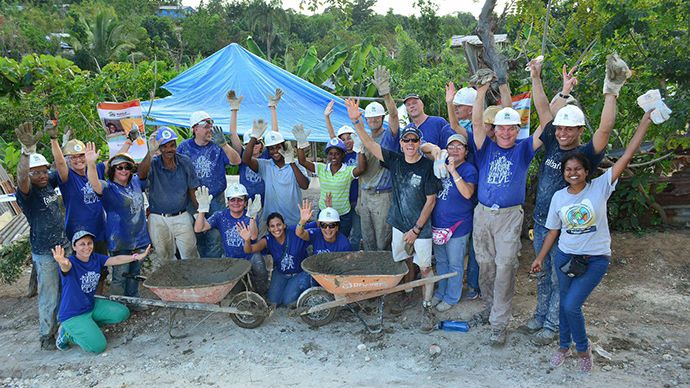
Washington state is a leader when it comes to Global Ambassadors, holding on to the No. 1 spot in the small, medium and large categories for colleges and universities producing Peace Corps volunteers. University of Washington leads large schools, while Western Washington University and Gonzaga University lead medium and small schools, respectively. In addition, there are over 4,000 in our state who have gone abroad to build houses with Habitat for Humanity. And, over 1,200 high-school students have traveled to Guatemala with Global Visionaries.
If you haven’t gone on a trip to a developing country, or if it’s been awhile, I encourage you to take the journey. Start by finding the organization, issue and region of the world that resonates with you and take action. You won’t regret it.

Kristen Dailey
Executive Director
Question of the Month

Hasan Minhaj
Have you seen Hasan Minhaj on The Daily Show or Stand Up Planet?
Will you be attending GlobalWA’s A Night of Comedy Featuring Hasan Minhaj on September 12?
In the News
Global Ambassadors: Local Organizations Creating Meaningful Experiences for Global Citizens
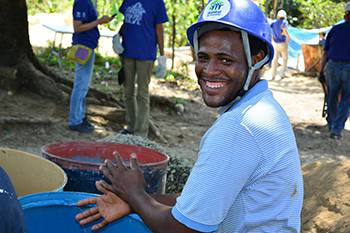
As the world grows more interconnected, increasing opportunities exist for people from all walks-of-life to travel abroad to study, volunteer or work. Such experiences enable participants to broaden their horizons, hone their language skills and make new, often lifelong, connections. There are also opportunities for teachers in the U.S. to develop future generations of global citizens by encouraging students to move beyond their comfort zones.
In addition to benefiting individuals, creating globally minded citizens benefits our community as a whole. Challenges we face in today’s world, which range from poverty to preserving the environment, are too big for any one nation to tackle alone. A global education and mindset allows us to dismantle stereotypes and collaborate with those from different backgrounds.
Volunteering Abroad
Volunteering abroad is the most direct way to create sustainable change in a community. There are a myriad of ways that people can apply their skills to be part of the solution to various problems that affect people across the globe. Doctors can treat patients in rural areas, engineers can build houses for those in need, and educators can teach children who lack solid teachers. Volunteers often live with locals, speak their language, and learn about their culture. This allows volunteers to gain a deep, nuanced understanding of a place, its people, and the unique challenges faced by their community. Donor trips are another way that people can be involved abroad and witness the difference that their generosity makes in the lives of others.
Studying Abroad
Students with international experience graduate with the language capabilities and cross-cultural communication skills needed in today’s world. Study abroad teaches participants to be self-reliant and understanding, and thus prepares students to be dynamic problem solvers. Learning to be accepting of differences and compassionate towards others are skills that students will need in all aspects of their lives, and will prepare them to work with others to tackle the world’s toughest challenges. Currently, only about 10% of students study abroad before they graduate college. Increased access to study abroad will create more opportunities for students to learn how to develop into global leaders with meaningful, impactful careers.
Educating Future Global Citizens
Students spend more time at school these days than they do at home. Teachers have an ability to influence children, expand their worldviews and show them the possibilities of what exists. Creating global citizens who are prepared for the world we live in is a necessity, and teachers must understand how to make local-to-global connections, and vice versa. School is often the first place that students will see the world as larger than just their family and their community, and grasp the concept that a world of possibilities exist for them.
Global Washington Members Working to Create Global Citizens
- Awamaki: Awamaki helps women’s associations in rural Peru start and run their own businesses selling artisan products. Volunteers teach product development, business and technical skills. They also help measure impact, collect stories and guide tourists to visit the artisan in their communities. Awamaki offers Peruvian women access to global markets and an improved quality of life in order to create sustainable development in their communities.
- Bainbridge Ometepe Sister Island Association (BOSIA): Since 1987, BOSIA has bolstered the relationship between Bainbridge Island and its sister island, Ometepe in Nicaragua. BOSIA promotes friendship and mutual understanding between students on Bainbridge and Ometepe. Together, volunteers from the two islands have constructed schools and water systems, learned each other’s languages and been welcomed into each other’s homes.
- buildOn: buildOn runs after-school youth service programs that mobilize U.S. urban teens to change their communities and, by extension, the world. The organization works with some of the most deserving high schools to help break the cycle of poverty. buildOn students participate in extensive local community service and build schools in some of the world’s poorest countries.
- Construction for Change: Construction for Change’s goal is to build safe, sustainable infrastructure for nonprofits across the world. The organization believes that building infrastructure is building opportunity. Skilled volunteers train and employ local workers and source local materials, allowing for significant investment in local economies.
- Engineers Without Borders Puget Sound Professionals (EWB): EWB partners with developing communities around the world to improve their quality of life. Chapter members use their professional skills to implement environmentally and economically sustainable engineering projects. The organization promotes long-term development by teaching local community members how to build and maintain the projects put in place by EWB.
- Global Brigades: Global Brigades is the world’s largest secular international volunteer organization, mobilizing more than 10,000 annual volunteers through 400 university chapters across North America and Europe. University volunteers support on-the-ground teams and community leaders to implement integrated health and economic development solutions in Central America and West Africa, ranging from mobile medicine to microfinance. In 2014, more than 150,000 patients were treated through its global health programs and thousands provided with access to community banking services.
- Global Partnerships: Founded in 1994, Global Partnerships (GP) is a nonprofit impact investor expanding opportunity for people living in poverty. GP pioneers and invests in sustainable solutions that help impoverished people earn a living and improve their lives. Currently, GP’s partners consist of social enterprises, including microfinance institutions and cooperatives focused around four impact areas: health services, green technology, rural livelihoods and microentrepreneurship. GP also offers Impact Journeys for investors to see their impact first-hand. The next Impact Journey is to Ecuador, November 14-22, 2015. For more information on this and future trips, contact Peter Solar.
- Global Visionaries: Global Visionaries’ mission is to educate and empower youth to become active leaders and global citizens. The organization’s cornerstone program is a school-year-long curriculum for high school students that culminates with a cultural immersion experience in Guatemala. The program emphasizes community service and promotes understanding of global interconnectedness.
- Habitat for Humanity Seattle-King County: Habitat for Humanity Seattle-King County was established in 1986 as an affiliate of Habitat for Humanity International. The group is dedicated to eliminating substandard housing locally and worldwide through constructing, renovating and preserving homes. To date, Habitat for Humanity Seattle-King County volunteers and staff have built, renovated or repaired over 300 homes.
- IE3 Global: IE3 Global provides a variety of study abroad, internship, exchange, and research opportunities to students at their partner institutions located throughout the Northwest and beyond. With a wide array of options in over 50 countries, students can choose a program tailored toward their specific academic and professional goals.
- MovingWorlds: org is like a short-term Peace Corps for skilled professionals. Its matching site helps you find the best place to volunteer your skills around the world, anytime, for any length of time. They call it #Experteering and if you can’t find an opportunity you like, its support team will work with you to find a project that’s right for you. Check out this recent feature on KOMO news. MovingWorlds is a membership community, but GlobalWA members get 10% off with code: WeLoveGlobalWA-2015.
- OneWorld Now!: Every young person having access to transformative international education opportunities is the vision of OneWorld Now! The organization is committed to providing critical language skills, leadership training and study abroad opportunities to underserved youth. OneWorld Now! believes all students should have the opportunity participate in community service abroad.
- Orphans to Ambassadors: Orphans to Ambassadors provides disadvantaged and orphaned children the opportunity to rise out of poverty with sustainable education. Experienced volunteers work with select institutions to promote sustainable change and self-sufficiency. The skills, knowledge and abilities that children gain developing their own solutions allows them to become ambassadors of goodwill and sustainability.
- Sister Schools: Sister Schools teaches compassion, service and social responsibility to young children, partnering students in Washington state with children in Ugandan schools and orphanages. Program participants learn about the lives of Ugandan children and then participate in a supply drive to send their sister schools much needed school supplies. Children in Uganda often send letters in reply. Volunteers are welcome to travel with Sister Schools on the annual Supply Distribution Tours in April, and other periodic tours.
- The Krista Foundation: The Krista Foundation for Global Citizenship serves young adults who have chosen to do a year of local or global service, offering volunteer best practices or “service ethics” with an emphasis on transforming a year of service into a life of service leadership. Through a peer-mentoring community, leadership and intercultural training, transition and debriefing services, the Krista Foundation equips young adults to leverage service experiences into a lifelong ethic of service, civic engagement and global understanding.
- The Northwest School: Located in Seattle, the Northwest School provides a curriculum for grades 6-12 that offers an international perspective and fosters independent and creative thinking. The school offers a liberal arts education that emphasizes the importance of understanding topics of international significance and encourages students to think globally.
- Women’s Empowerment Cancer Advocacy Network (WE CAN): WE CAN conducts breast and cervical cancer advocacy, education and outreach conferences in low and middle resource countries. The goal of WE CAN is to connect, train and support leaders of women’s cancer NGO’s. WE CAN is working to support patient advocates to raise awareness and improve access to women’s cancer treatments across the globe.
Global Washington Academic Institutions with Experimental Learning Programs Abroad
- Antioch University Seattle
- Bastyr University
- Community Colleges for International Development (CCID)
- Eastern Washington University
- Highline Community College
- Northwest School
- Pacific Lutheran University
- Seattle Pacific University
- Seattle University
- Shoreline Community College
- South Puget Sound Community College
- University of Puget Sound
- University of Washington Bothell
- University of Washington, School of Law Graduate Program in Sustainable International Development
- University of Washington, Evans School of Public Affairs
- University of Washington, Global Business Center at the Michael G. Foster School of Business
- University of Washington, Henry M. Jackson School of International Studies
- Washington State University, International Programs
Featured Organization
Habitat for Humanity Seattle-King County
By Kaitlin Marshall
With the vision of “a world where everyone has a decent place to live,” Habitat for Humanity “brings people together to build homes, communities, and hope.” For nearly 30 years, Habitat for Humanity Seattle-King County (Habitat SKC, an affiliate of Habitat for Humanity International) has been building new homes, renovating and repairing existing homes. In total, over 420 homes have been completed and more than 1,500 individuals have been served in King County.
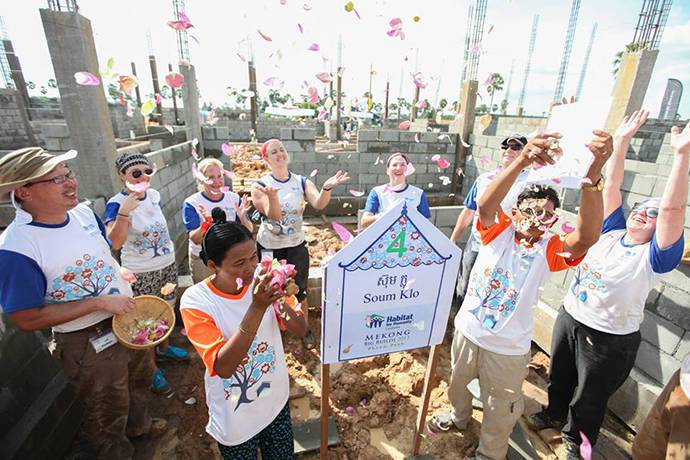 Using primarily volunteer labor, Habitat SKC builds houses affordably and then sells them at cost, with no profit gained and no interest accrued by the family served. While Habitat is well known for its construction of new homes, in recent years the local focus has shifted to neighborhood revitalization, which includes critical repairs and renovating and reselling foreclosed properties. Offering this expanded array of services and partnerships allows Habitat to serve more families, and help improve the overall quality of life in communities and neighborhoods.
Using primarily volunteer labor, Habitat SKC builds houses affordably and then sells them at cost, with no profit gained and no interest accrued by the family served. While Habitat is well known for its construction of new homes, in recent years the local focus has shifted to neighborhood revitalization, which includes critical repairs and renovating and reselling foreclosed properties. Offering this expanded array of services and partnerships allows Habitat to serve more families, and help improve the overall quality of life in communities and neighborhoods.
Habitat has an international presence, working in over 60 countries around the world. Each year, Habitat SKC gives 10% of their unrestricted donations to Habitat for Humanity International in tithe to build homes and improve living conditions in Bangladesh, Bolivia, Cambodia, Kenya, Nicaragua and Tajikistan. Donations from Habitat SKC have enabled the construction of more than 650 homes internationally. In August 2014, Habitat SKC was recognized for the largest fundraising tithe out of 1,500 Habitat affiliates nationwide.
In addition to raising money for international housing projects, Habitat SKC sends volunteers abroad to build homes on what the organization has named Global Village trips. Around 15 to 20 volunteers participate in each Global Village trip. Every building project is preceded by a team orientation and followed by a team debrief, which offers volunteers a chance to reflect on their experiences. Past Global Village trips have sent volunteers to Paraguay, Cambodia, Costa Rica, and Nicaragua. Kevin Hunter, acting CEO of Habitat SKC, explained that his organization is working to create local networks of volunteers that have an international reach. “We really believe that Seattle-King County, and frankly the whole Puget Sound region, is an innovation center,” said Hunter. “It has deep philanthropic interests and is a globally-minded market.”
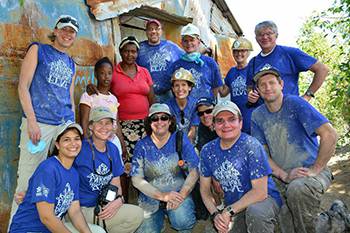 Hunter explained that there are three main challenges that impede access to sustainable housing around the world: Lack of economic opportunity, political instability, and the decimating effects of natural disasters. Habitat SKC wants to give volunteers opportunities to discover “how they can leverage their networks, their own capacity to make a difference, and advocate for affordable housing in whatever context they’re interested in.” Often times, people don’t have the economic means to acquire a house because, according to Hunter, “there’s a formal banking system that is out of reach for a lot of community members…There has to be alternative and creative funding opportunities, and Habitat can step in and fill a portion of that need.”
Hunter explained that there are three main challenges that impede access to sustainable housing around the world: Lack of economic opportunity, political instability, and the decimating effects of natural disasters. Habitat SKC wants to give volunteers opportunities to discover “how they can leverage their networks, their own capacity to make a difference, and advocate for affordable housing in whatever context they’re interested in.” Often times, people don’t have the economic means to acquire a house because, according to Hunter, “there’s a formal banking system that is out of reach for a lot of community members…There has to be alternative and creative funding opportunities, and Habitat can step in and fill a portion of that need.”
On every Global Village trip, volunteers work side by side with local beneficiaries. “The model of Habitat that you’ll see across the country and around the globe is really a hand up and not a handout,” said Hunter. Local residents and families are present on every build day and are involved in the construction of their future homes. Global Village participants form relationships with those they are helping and see first-hand how their volunteer work is transforming lives. Hunter, who was in the Dominican Republic this past January, explained, “It ends up being a profound experience when you have an opportunity to know that you’re fundamentally changing the trajectory of someone’s life by what you’re doing.”
By participating in Global Village trips, volunteers learn about barriers to sustainable housing worldwide and meet others with similar philanthropic interests. Habitat SKC instills in volunteers “a broader worldview of what’s happening in some of the most challenging places around the globe.” Global Village Trip participants develop a deeper understanding of the impact sustainable housing has on the well-being of individuals, families, and communities, and return home with a new network. “I’m always amazed,” said Hunter, “when I come back from one of these trips, how small the world is in terms of people that you know or get connected to…people that you had no idea were down the street and around the corner from you, thinking about the same kinds of things you’re thinking about.”
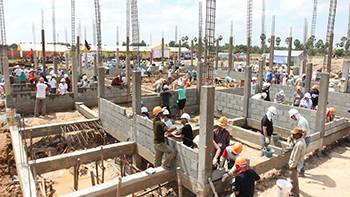 Habitat SKC has upcoming trips to Argentina, Nepal, and Cambodia. For anyone interested, Hunter advises, “Don’t spend too long thinking about it. Get plugged in! You just have to get this type of thing on the calendar, be intentional and go for it.” Looking ahead, Habitat Seattle-King County will continue collaborating with volunteers and local organizations to develop strategies that will lead to long-term change in the affordable housing crisis, both locally and globally. “It’s a huge problem,” said Hunter. “We all know it is, and we all know how important housing is. To be able to play a small part in helping one family at a time, one neighborhood at a time, one city at a time — it’s incredibly rewarding.”
Habitat SKC has upcoming trips to Argentina, Nepal, and Cambodia. For anyone interested, Hunter advises, “Don’t spend too long thinking about it. Get plugged in! You just have to get this type of thing on the calendar, be intentional and go for it.” Looking ahead, Habitat Seattle-King County will continue collaborating with volunteers and local organizations to develop strategies that will lead to long-term change in the affordable housing crisis, both locally and globally. “It’s a huge problem,” said Hunter. “We all know it is, and we all know how important housing is. To be able to play a small part in helping one family at a time, one neighborhood at a time, one city at a time — it’s incredibly rewarding.”
For more information on how to get involved and participate in a Habitat Global Build, contact Kelly White. Upcoming trips include: Buenos Aires, Argentina, October 16-25, 2015; Pokhara, Nepal, February 19, 2016 – March 6, 2016; and Kavre, Nepal, March 11-22, 2016
Changemaker
Chris Fontana, Chief Executive Officer, Global Visionaries
By Kaitlin Marshall
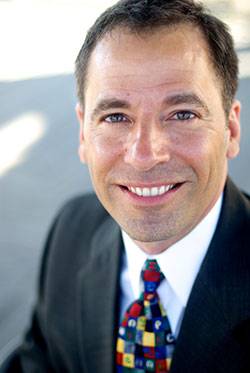 “To challenge and transform young people into socially and environmentally conscious global leaders.” That was what motivated Chris Fontana when he became Global Visionaries’ (GV) first Executive Director in 1999, and that still motivates him today. With the cornerstone of GV being a year-long leadership program that culminates in a two-week service trip to Guatemala, the GV team emphasizes community service at home and abroad while promoting understanding of global interconnectedness.
“To challenge and transform young people into socially and environmentally conscious global leaders.” That was what motivated Chris Fontana when he became Global Visionaries’ (GV) first Executive Director in 1999, and that still motivates him today. With the cornerstone of GV being a year-long leadership program that culminates in a two-week service trip to Guatemala, the GV team emphasizes community service at home and abroad while promoting understanding of global interconnectedness.
Under Fontana’s direction, more than 1,200 students have traveled to Guatemala. Participants in the GV leadership program return to their communities with the tools necessary to address social and environmental injustices.
As a kid growing up in Chicago, Fontana’s family (including his parents and five siblings) engaged in a unique, what he refers to as, democratic experiment. “Regardless of age, every member of the family was treated with equal worth, dignity, mutual respect and responsibility towards the group.” Being asked at the young age of five to become an agent of transformation within his family had a major impact on how Fontana views education.
As he grew older, the lessons he received from his family led him to question the status quo of the education system. “As educators, we’re tasked with creating confident individuals who possess skills and knowledge to be valuable global citizens and leaders,” said Fontana. “[However], we do this in classrooms that rarely create an atmosphere associated with that outcome.” Fontana, a former teacher who taught Spanish to middle and high school students for 13 years, strives to get youth out of the classroom and into the world to experience life lessons first-hand.
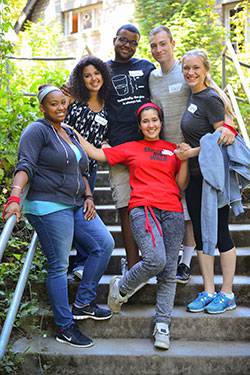 From 1992 to 1995, Fontana served as director of the Youth Environmental Summit (YES) and co-directed two youth-organized international conferences. The 1995 YES brought together 300 high school students from 32 countries and 40 states for a week of learning about environmental issues, social action and leadership skills. “Young people took on issues of international trade, land preservation — the Arctic National Wildlife Refuge in particular, overconsumption and climate change,” said Fontana. “It was powerful because it was all youth energy.” At both conferences, Fontana and his brother, Joe Fontana, worked with then high school student and future GV co-founder, Jason Foster. They began developing the idea for a youth-oriented global leadership program.
From 1992 to 1995, Fontana served as director of the Youth Environmental Summit (YES) and co-directed two youth-organized international conferences. The 1995 YES brought together 300 high school students from 32 countries and 40 states for a week of learning about environmental issues, social action and leadership skills. “Young people took on issues of international trade, land preservation — the Arctic National Wildlife Refuge in particular, overconsumption and climate change,” said Fontana. “It was powerful because it was all youth energy.” At both conferences, Fontana and his brother, Joe Fontana, worked with then high school student and future GV co-founder, Jason Foster. They began developing the idea for a youth-oriented global leadership program.
One of the defining characteristics of GV is, in Fontana’s words, that “youth lead youth.” Students who have completed the GV leadership program can then join the Youth Board and facilitate workshops for current program participants. The service projects that GV students complete help prepare them to be cooperative, innovative and compassionate leaders. “There’s no substitute for experience,” explained Fontana. GV gives students “opportunities to share in a responsibility for the world,” he says. “Everything we do is experiential. We don’t talk about creating opportunities for education; the students themselves build schools with their bare hands. We don’t talk about addressing climate change; the students plant forests.”
“We have an unrecognized prejudice against young people,” explained Fontana as he discussed ageism he has witnessed throughout his career. “We look at them as less then.” Fontana and GV take great care in listening to students and asking them their opinions. “What do you have to say? What are your perspectives? What do you think the answers are? I ask a lot of questions, and I listen more than I speak.” Fontana firmly believes that young people are capable of much more than most people give them credit for. “We’re doing a disservice to them and future generations if we don’t involve them in creating and participating in solutions that have a global impact.”
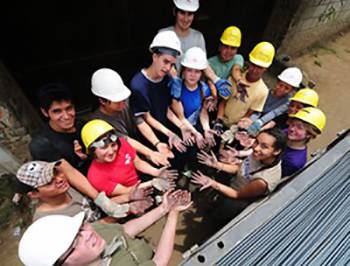 In the short-term, Fontana and GV will continue to create engaged global citizens within Seattle Public Schools. Ultimately, however, they aim to “transform the way we educate young people, both in school and out of school.” GV encourages students and guides them in creating their own unique solutions to address challenges. “You have to build on the positive,” said Fontana. “A young person needs encouragement like a plant needs water.” Students enter the GV program as learners who want to change the world, and leave as leaders capable of contributing to global solutions.
In the short-term, Fontana and GV will continue to create engaged global citizens within Seattle Public Schools. Ultimately, however, they aim to “transform the way we educate young people, both in school and out of school.” GV encourages students and guides them in creating their own unique solutions to address challenges. “You have to build on the positive,” said Fontana. “A young person needs encouragement like a plant needs water.” Students enter the GV program as learners who want to change the world, and leave as leaders capable of contributing to global solutions.
Welcome New Members
Please welcome our newest Global Washington members. Take a moment to familiarize yourself with their work and consider opportunities for support and collaboration!
Global Good
Global Good is a collaborative effort between Bill Gates and Intellectual Ventures to tackle some of humanity’s toughest problems through invention. The effort combines IV’s unique invention prowess with the expertise of government, NGO, scientific and commercial partners around the world. Together, they conceive, develop and deploy inventions that save lives. www.intellectualventures.com/globalgood
Village Reach
Village Reach saves lives and improves health by increasing access to quality healthcare for the most underserved communities. villagereach.org
Member Events
Aug 30: Water 1st International // Bike for Water
Sep 12: NPH USA // NPH USA Gala and After Dark
Sep 16: PATH // Dance4Demand Flash Mob
Sep 23: World Trade Center Seattle // Women in Business
Sep 23: Washington State University // International Career Fair
Oct 10: Mona Foundation // 16th Annual Celebration Dinner
Career Center
Highlighted Positions
Legislative Coordinator for Humanitarian Affairs – InterAction
Project/Department Coordinator – Committee for Children
Senior Specialist, Social Media Advertising – World Vision
For more jobs and resources, visit https://globalwa.org/resources/careers-in-development/
GlobalWA Events
August 27: Premiere of Around the World in Seattle
September 12: A Night of Comedy featuring Hasan Minhaj
September 16: New Member Orientation
December 10: GlobalWA 7th Annual Conference